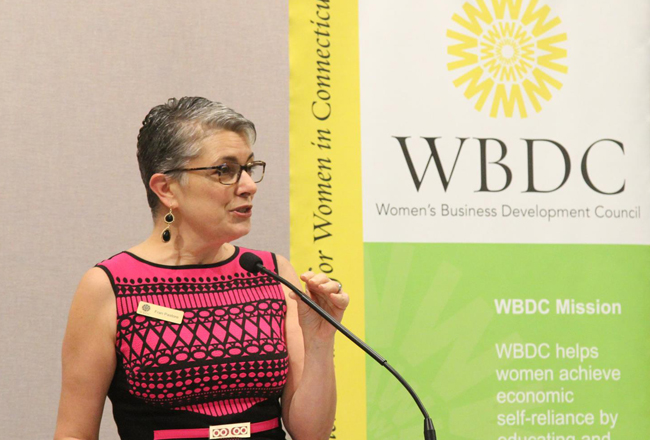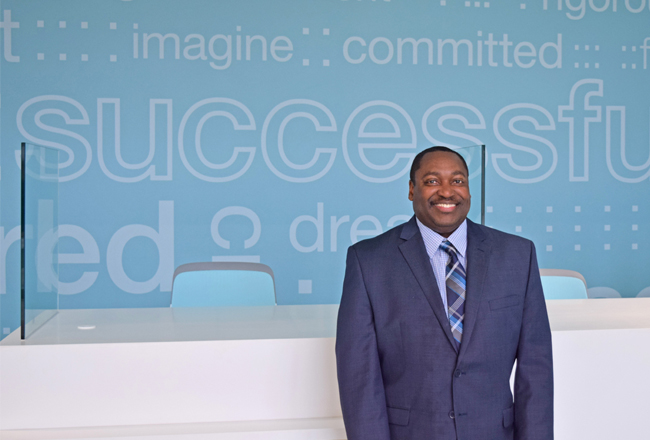As with so many Connecticut businesspeople these days, Fran Pastore is holding her breath waiting for a state budget to be finalized.
What sets Pastore apart from most is that, as president and CEO of the Women”™s Business Development Council, she”™s in the business of helping others start and maintain their own businesses.
“We”™ve had a significant amount of attrition,” Pastore said at the WBDC”™s Stamford headquarters. With a present headcount of 10, she added that the group won”™t be hiring anyone “until we know the state budget, and what we”™re getting from it.”

Also on hold is the WBDC Capital Fund, designed to provide startup and growing businesses with working capital, equipment, inventory and lease space, among other items; to date the fund has helped 23 clients secure $3 million in grants and loans.
Funded by the Small Business Administration”™s Office of Women’s Business Ownership, as well as contributions from federal, state and municipal governments, corporations, and private donors, the WBDC is a 501(c)(3) nonprofit that provides business and financial education to mostly female entrepreneurs and business owners throughout Connecticut. Pastore noted that the state budget impasse has put some of WBDC’s funding sources in a state of limbo.
Dealing with funding uncertainties may not the best way to mark this year’s 20th anniversary, but Pastore said she remains confident that past bipartisan support for the organization ”“ as well as WWE co-founder and former CEO Linda McMahon”™s position as SBA administrator ”“ will ultimately win out.
“I”™ve got to have faith that the WBDC will remain a viable institution,” she said. “This is not just a ”˜women”™s issue”™ ”“ it”™s an economic one.”
WBDC”™s numbers back her up. Its clients have generated $155 million in gross revenues and contributed $10.8 million in state tax revenues over the last three years. The organization maintains that for every dollar invested in it, 87 cents are reinvested in the community.
Since its 1997 inception, the group has served more than 18,000 clients, assisted in the creation of nearly 1,800 businesses, and helped with the sustaining and expansion of 3,500 established businesses.
The 56-year-old Pastore”™s passion for such endeavors began at an early age. “Even as a kid, I helped out wherever I could, stocking shelves, distributing fliers,” she said. “That continued throughout high school and college ”¦ I helped raise tons and tons of money for the schools I attended, working with corporations to sponsor events. But I never knew it could be a career for me.”
Graduating from Pace University with a bachelor”™s degree in communications, Pastore”™s first job was as an analyst for the New York Stock Exchange, where she examined “aberrational trades” at the height of the Ivan Boesky/Michael Milken insider-trading era.
It was during that time that she experienced firsthand the specter of sexual harassment, she said, “which forced me to leave.”
Finding herself in Stamford as a 33-year-old divorced mother of two young girls, with no family or financial resources to draw from, Pastore said she was fortunate to have a network of “incredible girlfriends who were highly educated and very successful, who became my coaches in different areas of business and life.”
Starting the WBDC was a way of combining her passion about women”™s economic equity and interests in small business and education, she said. The opportunity to form such a group was there for the taking, as Connecticut was then the only state without a certified educational resource for women entrepreneurs and business owners ”¦ ironic, given that then-Connecticut Sen. Joseph Lieberman sat on the Senate”™s Small Business Committee.
Flying to D.C. to meet with Lieberman, as well as then-Sen. Chris Dodd and then-Rep. Chris Shays, Pastore said she was encouraged by Lieberman to form a nonprofit corporation and apply for a $125,000 seed-money grant to redress the situation.
“It was not an option for me not to do so,” she said. “This was the path I was meant to follow, and the combination of opportunity and necessity was something I couldn”™t pass up.”
The WBDC had “some great years” at the beginning, Pastore said, hitting the ground running by offering training, coaching, technical assistance ”¦ anything, really, that a business owner might need. Its budget had increased from the initial $125,000 to “not quite $1 million” when the events of Sept. 11, 2001, occurred.
The resulting economic downturn meant that the group lost a significant amount of corporate support. “It became more and more difficult to manage, from payroll on down,” Pastore said.
An appeal to then-Stamford Mayor Dannel Malloy resulted in the group taking up residence in the conference room at the city”™s Government Center from 2002-2010, where the WBDC helped launch Malloy”™s Small Business Initiative in the city.
Though funded in part by the federal government, the WBDC at that time was not receiving matching funds from the state, as most of its work was being done in Fairfield County. “So we started expanding our reach with partnerships around the state,” Pastore said.
By 2005 the organization had secured those matching state funds; today it maintains offices in Hartford, Derby and Danbury as well as its Stamford headquarters at 184 Bedford St.
Women”™s economic equity has of course remained a top priority; the much-documented “glass ceiling” is still very much in place for many. “A lot of women are also prone to domestic violence and sexual assault, both of which I have experienced,” she said. “And there are other social issues ”“ challenges in finding child care, caring for aging parents, going through a divorce. But we”™re here to show that entrepreneurship is a teachable, and reachable, goal.”
Regardless of education and socio-economic background ”“ “We serve GEDs to Ph.D.”™s,” Pastore said — women face the same issues worldwide. “I”™ve traveled to four Third World countries, and there are the same interests and issues everywhere,” she said.
Progress is being made: according to Go4Funding, one in 11 adult women is an entrepreneur, while the National Women”™s Business Council reports that U.S. women-owned businesses are growing 2 ½ times the national average of all firms ”“ and that, if U.S. women-owned businesses were their own country, they would have the world”™s fifth-largest GDP. A recent American Express report stated that 11.3 million women-owned businesses in the U.S. generate more than $1.6 trillion in revenues and employ 9 million people.
“When women have economic equity, they have decision-making abilities ”“ and more power,” Pastore said.
Still, she admitted, “Gender bias continues to exist. On average a woman has to make six attempts to secure a traditional loan, and less than 1 percent of the venture capital out there is available to women ”“ and we know why.”
A lack of preparedness when seeking capital is one of the most common factors, she said. “That”™s why we offer financial coaching, to explain how to ”˜talk the talk”™ that bankers and lenders want to hear. Having a coherent business plan and mission is critical.”
Even with the financial predicament facing so many today, Pastore said she remains confident that the WBDC ”“ and women entrepreneurs and business owners in general ”“ will prevail.
“We”™ve been through tough economic times and challenges before,” she declared. “But I firmly believe that we have a bright future.”






















